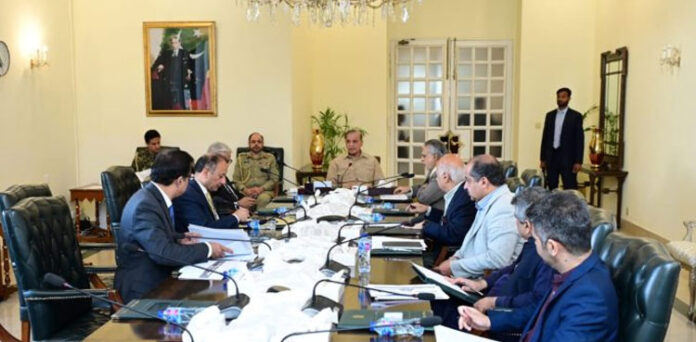The National Economic Council (NEC), the country’s highest forum for economic decision-making, has approved a target of 3.5 percent GDP growth for the fiscal year 2023-24 budget.
This growth target represents a significant increase of 1066.67 % compared to the 0.3 % growth rate recorded in the outgoing fiscal year of 2022-23. Despite implementing painful fiscal adjustments and adhering to the reform agenda set by the International Monetary Fund (IMF), the government remains optimistic about achieving this target.
The GDP growth rate for the outgoing fiscal year fell significantly to 0.3 %. Minister Ahsan Iqbal, however, defended the realistic nature of the next year’s target, emphasizing that the government’s choices are aimed at stabilizing the country. He made this announcement during a press conference in Islamabad following an NEC meeting chaired by Prime Minister Shehbaz Sharif.
Iqbal claimed that the growth target was realistic. “We are taking those choices which take the country toward stability,” he added.
The minister did not disclose other budget targets except for the GDP and development spending which he said will be up to Rs 1.15 trillion.
According to him the government has estimated a 21 % inflation projection for the fiscal year 2023-24.
Iqbal also pointed out the dismal condition of the economy, saying the government would not be able to pay off debt fully through federal revenue in the next year.
“This is a defining moment of where we have reached,” he said. “(The country) will need to borrow for the rest of the budget that includes salaries for the government, defense budget, development budget, pension and subsidies,” he added.
He said that the proposals also included a fiscal deficit target of 7.7 percent of GDP and a revenue collection target of Rs 9.2 trillion.
The minister claimed that the NEC was also informed about the development outlook of 2035 under which Pakistan’s economy will be at least $ 570 billion whereas, he believes that the country could be of $ $1000 billion economy by 2035 if the development plan is implemented.
Development Budget:
During the meeting of NEC on Tuesday, the forum also proposed the Annual Development Plan (ADP) for the upcoming fiscal year (2023-24) with a total outlay of Rs 2.709 trillion.
“The total national outlay contains the development budget of Punjab and Khyber Pakhtunkhwa for only four months due to caretaker set up in the provinces, but if their full budget is included in the ADP, it will exceed the figure of Rs3 trillion,” Minister for Planning, Development and Special Initiatives Ahsan Iqbal said in the post-NEC meeting media talk.
Under the ADP, the minister said the federal government will spend Rs1,150 billion under the Public Sector Development Programme (PSDP 2023-24) while the provinces will allocate Rs1,559 billion to execute different development projects.
He said Rs1,150 billion under the PSDP was the highest-ever allocation made in the history of the country, terming it a ‘milestone achievement’ of the incumbent government despite severe financial challenges.
Energy Conservation
Ahsan Iqbal said that the NEC has also approved an energy conservation plan under which shops and commercial centers would be closed by 8pm.
Iqbal said that issues pertaining to energy and infrastructure were discussed during the meeting, adding that “energy is becoming a huge challenge for Pakistan due to global prices”.
“Saudi Arabia has cut down oil production by one million barrels, which poses a risk of oil prices rising to $100 per barrel,” he said, highlighting that if the country continued to rely on fossil fuel and oil for its energy needs, “our economy will remain vulnerable”.
To counter this, he said thT one of the measures that the government wanted to implement was energy conservation.
Iqbal recalled that the federal cabinet vowed to enforce decisions under a National Energy Conservation Plan in January this year. “But there was no representation of provinces in that meeting. So we took it up again in the NEC, where provincial government representatives were also present.
“And now we hope that provincial governments will ensure the implementation of the energy conservation package that has been approved today.”
The energy conservation plan discussed in the federal cabinet in January proposed closure of markets at 8:30pm and wedding halls at 10pm, the use of efficient electronic appliances, and a 40% reduction in power consumption in government offices.
It also recommended the imposition of additional duties on inefficient electric fans, use of light-emitting diode LED bulbs, the introduction of electric bikes and phasing out motorcycles that run on petrol and illuminating street lights only at 50 % capacity.
Iqbal said today that the steps for energy conservation recommended under this plan, such as the closure of shops and commercial centers by 8pm, switching to LED lights and upgrading geysers to make them more energy efficient, could help the country save up to $1 billion annually.
Speaking specifically about the early closure of shops, Iqbal said even rich nations in Europe and the US could not “afford the luxury of keeping commercial areas open till 10pm or 11pm”.
“No [country] has an irresponsible lifestyle as us, keeping shops open till 1am or 2am.”
The minister also said that another decision taken regarding the energy sector was to promote green energy.
“Projects of solar, wind and hydel energy will be promoted and we will not introduce any new project based on imported fuel,” he said.
























